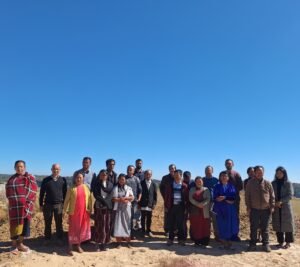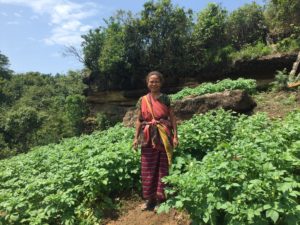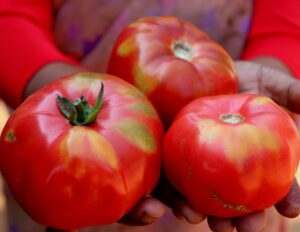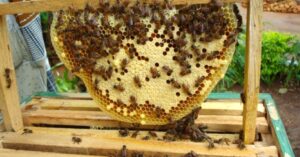Taking a significant step towards ensuring the well-being of young learners, a School Meal Programme was organised by NESFAS in collaboration with Directorate of School Education and Literacy (DSEL), Meghalaya, on November 19, 2024, at Laitsohpliah Community Hall. The event witnessed a conglomeration of community leaders, educators, parents, and experts to discuss and celebrate the initiative. 
Before the formal programme started, participants embarked on a visit to Laitsohpliah and Subakalai school gardens, thereby gaining firsthand insights into the practical implementation of school gardens. These gardens are not only sources of fresh, locally sourced food for school meals but are also valuable educational tools.
The program commenced with a warm welcome address by Bah W Marwein, Headman of Laitsohpliah.
Bah Pius Ranee, Executive Director of NESFAS, provided a comprehensive overview of food systems while also highlighting their crucial role in sustainable development, and said, “Children have more knowledge in terms of biodiversity because of teachers like Babu Nestar have innovative approaches in teaching and learning such as Agrobiodiversity walks accompanied by traditional knowledge holder.” He further stated that the program is crucial because the community is placed at the forefront and they play a very important role. There is a global target to provide nutritious food to school children by 2030 and he encouraged everyone to aim toward achieving the said target and Meghalaya can take the lead in collaboration with like minded individuals and other stakeholders.
Babu Nestar Kharmawphlang, Head Teacher of Laitsohpliah RCLP school, noted that school meals were initiated by NESFAS to tackle the problem of malnutrition. He said “We have designed a model to utilise biodiversity to provide nutrition to school children, who were initially reluctant to consume wild edibles but after intervention and customisation of recipes, the children have developed their tastes.” He also stated that school gardens not only aid in supplementing meals but also give opportunities for children to connect with nature.
Kong Barilin Swer, parent & ALC farmer, shared the perspective of a parent and local farmer, and highlighted the positive impact of school meals on their children’s health and education, and the importance of five food groups that are included in the meals, thereby saying that parents are now trying to replicate the meals at their respective homes as well and encouraged other parents to donate vegetables so that children can all share them in their schools.
Swapnil Tembe, Director of DSEL, congratulated NESFAS and school teachers on their efforts to promote school meals, while also emphasizing the government’s commitment to supporting such initiatives and stated that school nutrition gardens are one of the most important assets that every school ought to have. He was quoted as saying, “This collaborative approach is essential for the long-term success of the program. I believe that by expanding these initiatives and incorporating meals, we can further enhance the nutritional well-being of our students and address critical health issues like malnutrition and anemia. Let us continue to prioritize local, seasonal foods and empower the next generation to become responsible food consumers and producers.”
The event concluded with a school meal lunch, showcasing the wholesome and nutritious meals prepared using locally sourced ingredients.
Initiatives such as these programmes signify a promising step towards creating a brighter future for school children. By providing nutritious meals and fostering sustainable food systems, the school meal programme is an important step in empowering young minds and building healthier communities.





